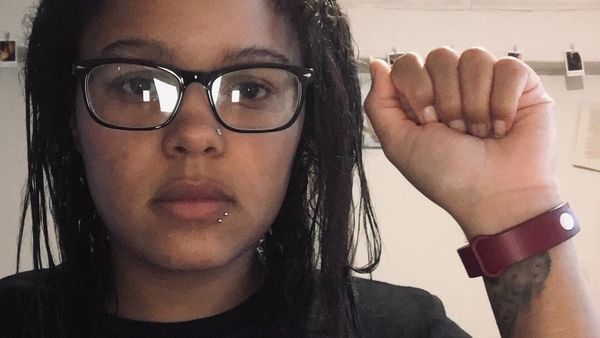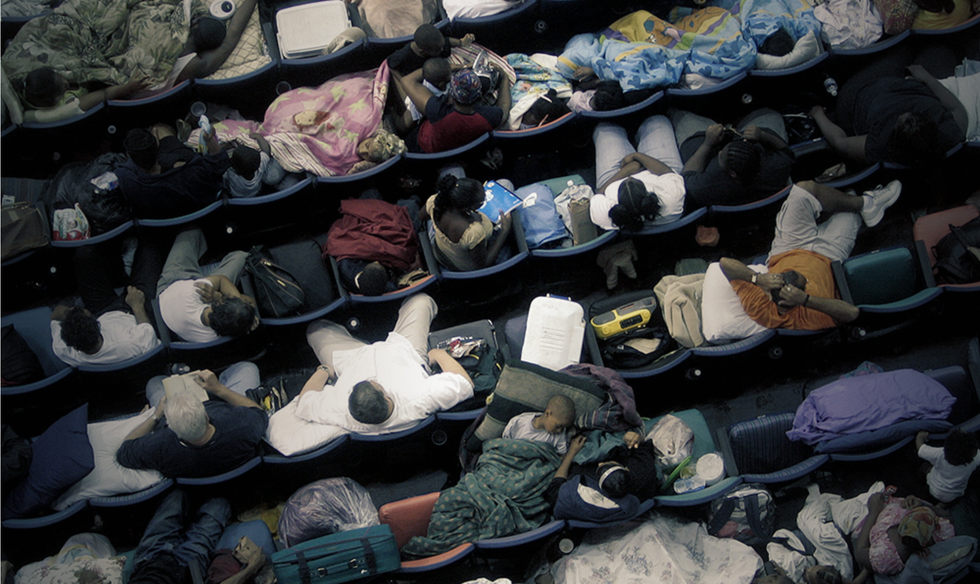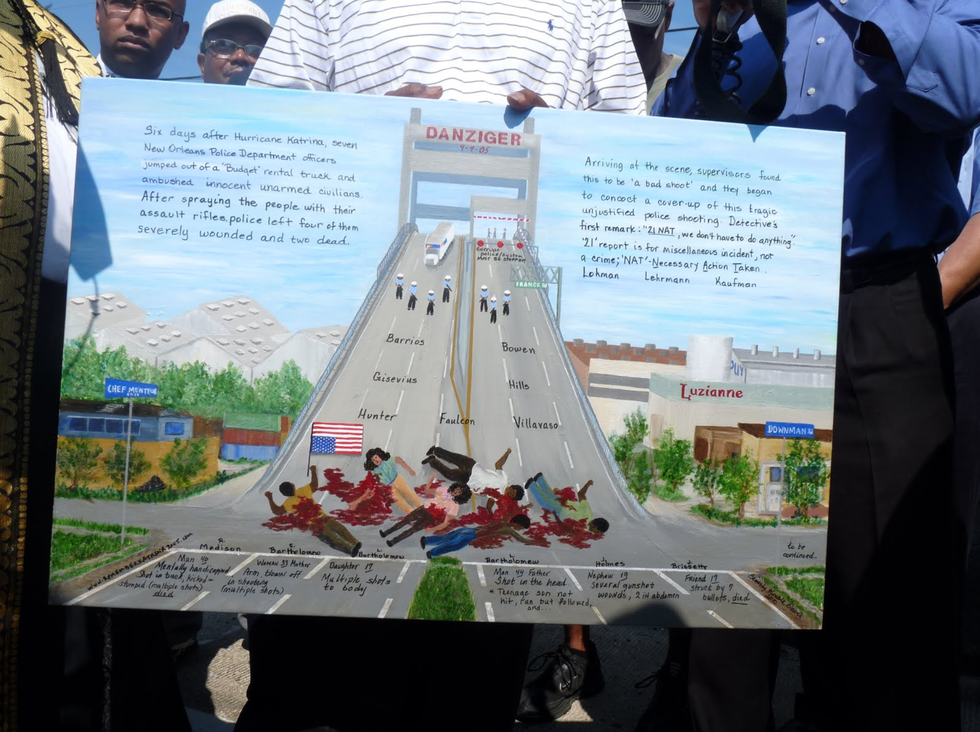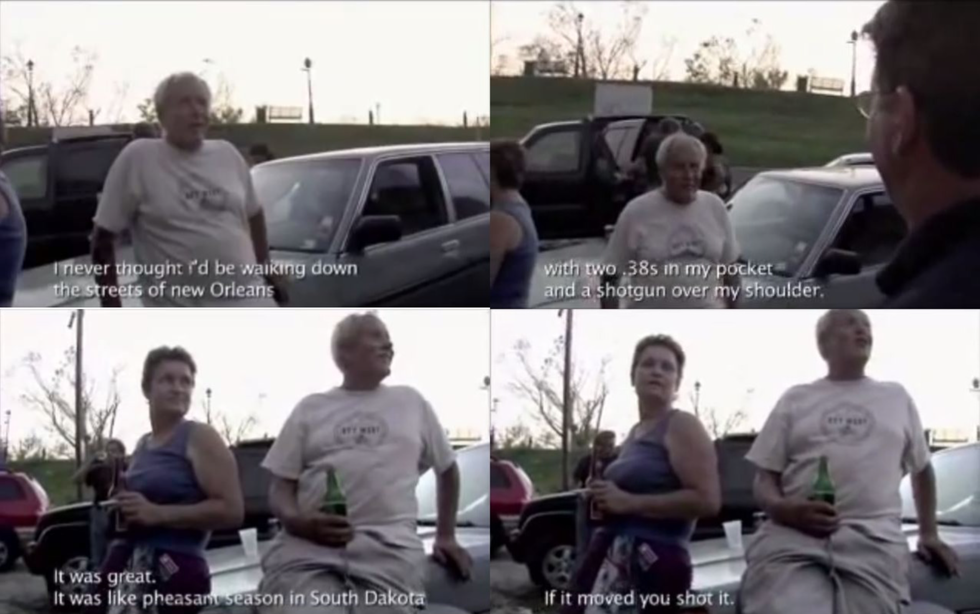The release of the Formation video two weeks ago can be marked as a major breakthrough in the visibility of the #BlackLivesMatter movement. Since it’s inception in 2013, BLM’s representation in the media has been limited to mostly racially-charged depictions of protests and a few discussions on news shows. From its general coverage as distressed shouts on tense college campuses and poor black communities to powerful visuals of a black anthem sung out by a 20-time Grammy winner, Beyoncé helped to amplify a new image for the movement. The response has been varied. The video has been reduced to a simple celebration of hair, as well as amplified to a declaration of war against "Oppressed Whites(TM)." A less discussed, but highly controversial segment of the video, to the people who understand and agree with its message, is Beyoncé’s direct call to attention to the aftermath of Hurricane Katrina in 2005 in the song’s introduction and throughout the video in clips of submerged houses and police cars.
Many are now asking, is Beyoncé entitled to Katrina imagery? She was obviously not directly affected by the natural disaster. Some have called the video an exploitation and appropriation of the trauma of Katrina victims. The complaints about its presence are valid, but they are best understood if you know the exact horror of what went down after the levees broke. One of the first things that I did after my initial 20-minute binge of the Formation video on replay was research. What did happen in New Orleans?
Maybe it's miscommunication based on my distance to the event, in miles and in years, as well acknowledged ignorance, but the extent of the racial tensions in the face of this disaster was unknown to me before the video release. The willingness of the media and the government to believe and perpetuate stereotypes of barbarianism too commonly forced on people of color, as well as the widespread tolerance of black pain by all, is exposed at it’s most disgusting degree in the weeks of chaos after the hurricane.
Aside from discussions of poor evacuation routines that could be held responsible for a large portion of the approximate 986 Katrina-related deaths in Louisiana and claims that George Bush didn't care enough about black people to save them, is the rumor-mongering of extreme violence and lawlessness in the streets of New Orleans and in the Superdome and Convention Center, both of which were converted to shelters for affected citizens before their evacuation. The Chicago Tribune stated it best when it declared that: “[something] else gave way last week besides the levees that had protected New Orleans from the waters surrounding it: the thin veneer of civility and practiced cordiality that in normal times masks the prejudices and bigotries held by many whites in this region of Deep South Louisiana." Images of black people looting (versus white people “finding” supplies) were plastered on the news and city officials went on popular daytime television shows, such as Oprah, to declare the Superdome overflowing with dead bodies, murderers, and rapists. Neighboring cities, such as Baton Rouge, shuddered in fear as “New Orleans thugs," otherwise known as the poor people who had just lost their homes and almost their lives to a natural disaster, came into their shelters as refugees.
The ease with which the public vilify black folk, due to centuries of dehumanization and oppression, proved to be greater than traditions of southern sweetness. This pattern has continued into the present and arguably has expanded with the increased fight against police brutality. The government didn’t expect the majority-black inhabitants of the Superdome to behave ethically, which is why, when they sent huge refrigerator trucks to collect the expected piles of corpses from the makeshift shelter, they were only met with six bodies, which included four natural deaths and one suicide. In fact, it was the New Orleans police and the makeshift majority white “neighborhood watch” gangs that showed higher levels of lawlessness in terms of deaths over those left in the dome without a basic sanitary environment.
Accounts of police brutality, of which the Danziger Bridge shootings take center stage, are horrifying, but unfortunately not surprising. More shocking was the outright refusal of less-affected communities in New Orleans to accept victims of flooding, as well as their violent motions against accepting those who they saw as damaging to their neighborhood. At Algiers Point, a group of white residents attempted to seal off their community from evacuees using trees and lumber to block roads and create barricades. "They stockpiled handguns, assault rifles, shotguns and, at least, one Uzi and began patrolling the streets in pickup trucks and SUVs. The newly formed militia, a loose band of about fifteen to thirty residents, most of them men, all of them white, was looking for thieves, outlaws or, as one member put it, anyone who simply ‘didn’t belong’.” Members of this group have admitted to shooting random African-Americans in subsequent interviews by journalists and documentary directors, feeling protected by their idea that they were protecting themselves from vigilantes. However, they haven’t, nor have their victims, ever been approached by the NOPD for investigations, despite hospital check-ins and multiple witnesses of plainly gunshot-wounded corpses around Algiers Point.
We should ask ourselves, had these vigilantes been comprised of black members, had the “opportunity to hunt black people” been reversed to target white people, would this group have faced significant repercussions? Did black lives matter in the aftermath of Hurricane Katrina?
The song doesn’t contain explicit black power or BLM lyrics, which undermines the legitimacy of Beyoncé’s desire to maximize awareness, but artists are allowed to use many mediums to expand the meanings of their work. I empathize with arguments stating that visuals are not enough while also remembering that Beyoncé must operate within the confines of what white media finds acceptable to maintain her position of influence. Investigators of the racial crimes during the disaster could be viewed as predecessors to BLM leaders, given the similarity of issues addressed.
The government wasn't prepared for the magnitude of the disaster that was Katrina and, given NOLA's majority black population, Katrina was one of the most televised accounts of black suffering. The willingness of the public to disregard the pain of Katrina victims and focus instead on looting or on stretching out claims of protection of private property to the most extreme degree in order to accept the open and uninvestigated shooting of black people because of aforementioned "looter" stereotypes, should have been a wake-up call to America. Amongst lessons learned from one of the worst disasters to occur on American soil, proper respect for black suffering was not included in calls for better structural engineering or disaster-preparedness. The failure of the government and the media to attempt to address and correct its own racist predispositions--since Katrina and before--have only led to more and more widespread black pain. Outrage at this fact has cumulated to present Black Lives Matters protests (which are still disregarded using toxic black stereotypes). Under this pretense, the attempt by Beyoncé, who is a black woman who is still affected by racist stereotypes at her core, to take back some of the power that black people lost that summer seems more justifiable.
Given that I am not black and I wasn't affected by Hurricane Katrina, I could still appreciate the much-needed themes of black empowerment in Beyoncé's recent works and I hope with everything that I am that change can happen soon.
























